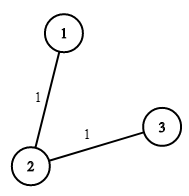村里面一共有 n 栋房子。我们希望通过建造水井和铺设管道来为所有房子供水。
对于每个房子 i,我们有两种可选的供水方案:
- 一种是直接在房子内建造水井,成本为
wells[i]; - 另一种是从另一口井铺设管道引水,数组
pipes给出了在房子间铺设管道的成本,其中每个pipes[i] = [house1, house2, cost]代表用管道将house1和house2连接在一起的成本。当然,连接是双向的。
请你帮忙计算为所有房子都供水的最低总成本。
示例:
输入:n = 3, wells = [1,2,2], pipes = [[1,2,1],[2,3,1]] 输出:3 解释: 上图展示了铺设管道连接房屋的成本。 最好的策略是在第一个房子里建造水井(成本为 1),然后将其他房子铺设管道连起来(成本为 2),所以总成本为 3。
提示:
1 <= n <= 10000wells.length == n0 <= wells[i] <= 10^51 <= pipes.length <= 100001 <= pipes[i][0], pipes[i][1] <= n0 <= pipes[i][2] <= 10^5pipes[i][0] != pipes[i][1]
并查集。
模板 1——朴素并查集:
# 初始化,p存储每个点的父节点
p = list(range(n))
# 返回x的祖宗节点
def find(x):
if p[x] != x:
# 路径压缩
p[x] = find(p[x])
return p[x]
# 合并a和b所在的两个集合
p[find(a)] = find(b)模板 2——维护 size 的并查集:
# 初始化,p存储每个点的父节点,size只有当节点是祖宗节点时才有意义,表示祖宗节点所在集合中,点的数量
p = list(range(n))
size = [1] * n
# 返回x的祖宗节点
def find(x):
if p[x] != x:
# 路径压缩
p[x] = find(p[x])
return p[x]
# 合并a和b所在的两个集合
if find(a) != find(b):
size[find(b)] += size[find(a)]
p[find(a)] = find(b)模板 3——维护到祖宗节点距离的并查集:
# 初始化,p存储每个点的父节点,d[x]存储x到p[x]的距离
p = list(range(n))
d = [0] * n
# 返回x的祖宗节点
def find(x):
if p[x] != x:
t = find(p[x])
d[x] += d[p[x]]
p[x] = t
return p[x]
# 合并a和b所在的两个集合
p[find(a)] = find(b)
d[find(a)] = distance对于本题,可以将节点 0 视为水库,水库到房子间的成本等于房子内建造水井的成本。因此此题可以转换为最小生成树问题。
class Solution:
def minCostToSupplyWater(self, n: int, wells: List[int], pipes: List[List[int]]) -> int:
for i, w in enumerate(wells):
pipes.append([0, i + 1, w])
pipes.sort(key=lambda x: x[2])
p = list(range(n + 1))
def find(x):
if p[x] != x:
p[x] = find(p[x])
return p[x]
res = 0
for u, v, w in pipes:
if find(u) == find(v):
continue
p[find(u)] = find(v)
res += w
n -= 1
if n == 0:
break
return resclass Solution {
private int[] p;
public int minCostToSupplyWater(int n, int[] wells, int[][] pipes) {
int[][] all = new int[pipes.length + n][3];
int idx = 0;
for (int[] pipe : pipes) {
all[idx++] = pipe;
}
for (int j = 0; j < n; ++j) {
all[idx++] = new int[]{0, j + 1, wells[j]};
}
p = new int[n + 1];
for (int i = 0; i < p.length; ++i) {
p[i] = i;
}
Arrays.sort(all, Comparator.comparingInt(a -> a[2]));
int res = 0;
for (int[] e : all) {
if (find(e[0]) == find(e[1])) {
continue;
}
p[find(e[0])] = find(e[1]);
res += e[2];
--n;
if (n == 0) {
break;
}
}
return res;
}
private int find(int x) {
if (p[x] != x) {
p[x] = find(p[x]);
}
return p[x];
}
}class Solution {
public:
vector<int> p;
int minCostToSupplyWater(int n, vector<int>& wells, vector<vector<int>>& pipes) {
p.resize(n + 1);
for (int i = 0; i < p.size(); ++i) p[i] = i;
for (int i = 0; i < n; ++i) pipes.push_back({0, i + 1, wells[i]});
sort(pipes.begin(), pipes.end(), [](const auto& a, const auto& b) {
return a[2] < b[2];
});
int res = 0;
for (auto e : pipes)
{
if (find(e[0]) == find(e[1])) continue;
p[find(e[0])] = find(e[1]);
res += e[2];
--n;
if (n == 0) break;
}
return res;
}
int find(int x) {
if (p[x] != x) p[x] = find(p[x]);
return p[x];
}
};var p []int
func minCostToSupplyWater(n int, wells []int, pipes [][]int) int {
p = make([]int, n+1)
for i := 0; i < len(p); i++ {
p[i] = i
}
for i, w := range wells {
pipes = append(pipes, []int{0, i + 1, w})
}
sort.Slice(pipes, func(i, j int) bool {
return pipes[i][2] < pipes[j][2]
})
res := 0
for _, e := range pipes {
if find(e[0]) == find(e[1]) {
continue
}
p[find(e[0])] = find(e[1])
res += e[2]
n--
if n == 0 {
break
}
}
return res
}
func find(x int) int {
if p[x] != x {
p[x] = find(p[x])
}
return p[x]
}
